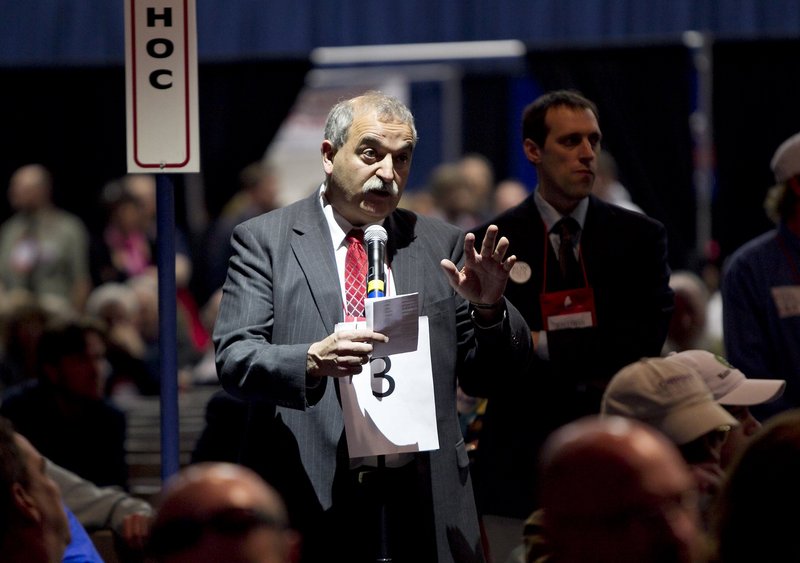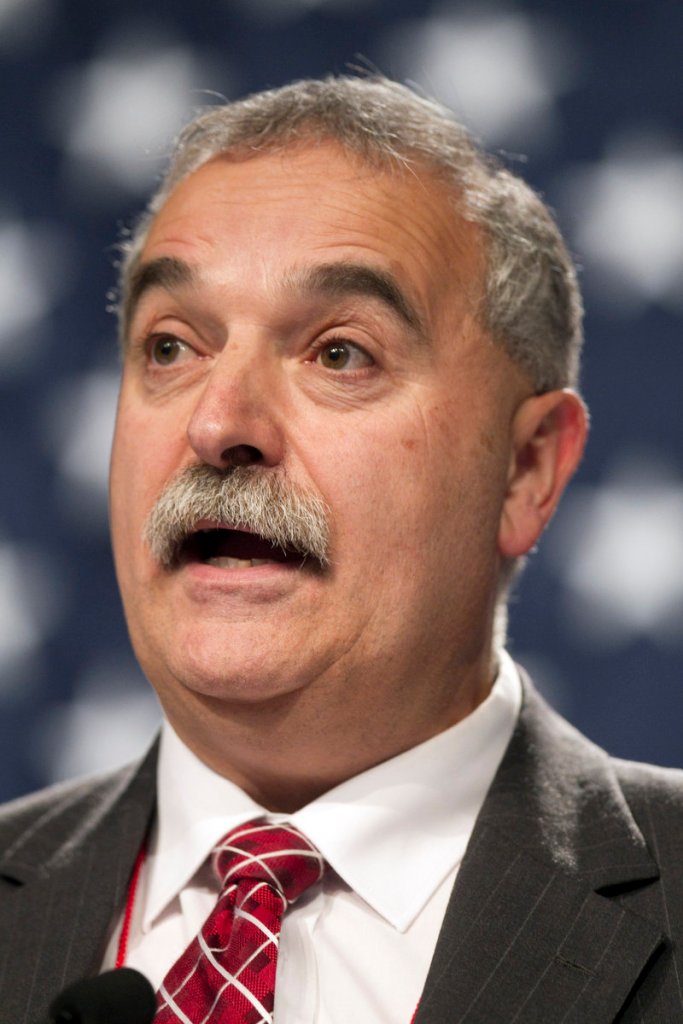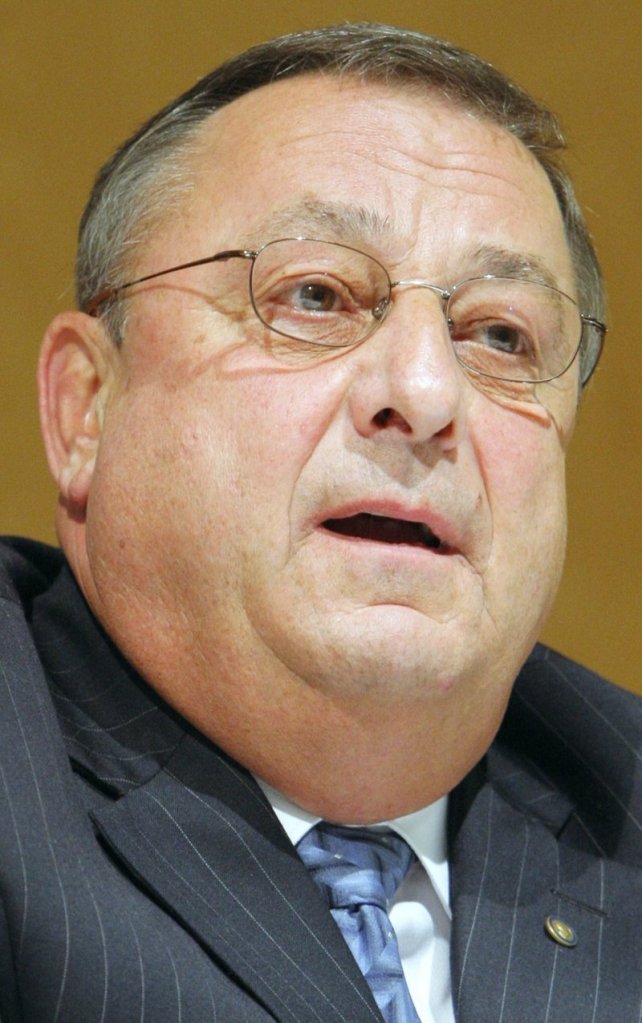Charlie Webster, the hard-charging partisan who helped orchestrate a Republican takeover in Augusta in 2010 only to see it slip away in Tuesday’s elections, said Thursday he will not seek re-election as chairman of the Maine Republican Party.
Webster announced his decision two days after Republicans lost control of Maine’s House and Senate in a hard-fought election that broke spending records for legislative races.
The party made major strides in fundraising and recruiting candidates under Webster but was wracked by internal tension that peaked with a delegate fight during the Republican National Convention.
Webster also battled with Gov. Paul LePage.
“Within two days of (LePage’s) election, he made clear that his people were going to run the party,” Webster said Thursday evening. “I made clear that wasn’t going to happen.”
Webster said he believed he had support for another term as party chairman and might have sought one “if we had won again and I had a different relationship with the governor.”
He notified Republican State Committee members of his decision Thursday, roughly three weeks before the committee meets to elect party leaders.
“If we had won the Legislature, I might have stayed another term,” Webster said. “But I promised my wife that I would only do four years … to see if we can make a difference, and I think we did.”
Brent Littlefield, LePage’s political adviser and one of the people Webster suggested wanted to “run the party,” chuckled when told of Webster’s statement but declined to respond specifically.
“We thank him for his service to the people of Maine and especially for his work to … put more money in the pockets of working people rather than in ineffective programs,” Littlefield said.
The Maine Republican Party made dramatic gains during Webster’s tenure, although some have downplayed the extent to which he was responsible for those gains.
In April 2009, Webster and Republican leaders in the Legislature held a news conference on the banks of the Kennebec River in Augusta to unveil what would be essentially a new public campaign.
“Working people vote Republican” bumper stickers and signs began popping up around the state. Webster sought to drive home that point in every media interview, by talking about how Republicans — not Democrats — represented the interests of truck drivers, waitresses and other blue-collar Mainers.
Webster was heavily involved in recruiting candidates for legislative races and, in November 2010, his party won control of both chambers of the Legislature and the governor’s office for the first time since the 1960s.
Those victories were aided in no small part by the grass-roots efforts of tea party supporters and a national anti-Democratic sentiment.
Webster clashed with LePage — more specifically, with some of the governor’s staff and advisers. Despite tension, Webster helped set the agenda in the Legislature and contributed to the messaging as Republicans pushed for welfare reform, pension reform and lower taxes.
When it comes to grass-roots organizing, “few people can hold a candle to him,” said Rep. Andre Cushing of Hampden, who became assistant majority leader in the Republican-controlled House.
“I think he has been one of the most effective advocates for us when it comes to party building, helping with candidates, helping with fundraising,” Cushing said. “He is someone who is tireless in terms of going out and meeting folks.”
Where Webster was less effective, Cushing said, was in handling administrative tasks, the media and various factions within the party.
Always the Republican bulldog, Webster infuriated Maine Democrats with some of his public statements, such as his unfounded claim that “busloads” of college students had been brought to polls in the past to sway elections in Democrats’ favor.
But some of Webster’s loudest critics of late were within his own party.
In February, supporters of Republican presidential candidate Ron Paul cried foul when Webster declared that Mitt Romney had won Maine’s county caucuses before all of the votes were counted. Some Republicans pushed for Webster’s resignation, even creating a Facebook page titled “The End of Charlie Webster.”
Anger over the caucuses bubbled up in May, when Paul’s supporters took over the state convention and elected their own delegates to 21 of Maine’s 24 seats at the Republican National Convention.
Webster was blamed again when national party leaders — responding to a formal complaint by Romney supporters in Maine — replaced 10 of the pro-Paul delegates with 10 Romney supporters during the convention in Tampa.
Tension was so high in Tampa that the Paul and Romney camps from Maine stayed in separate hotels and barely communicated.
Throughout the drama, Webster played the part of dutiful leader of a divided party by constantly bouncing between the factions and trying to mediate between Paul supporters and national party leaders.
A little more than two months later, Maine Republicans lost enough House and Senate seats to lose their majorities. Webster blamed the unprecedented amount of outside spending on the legislative races — and more specifically, the money pumped in by unions and other groups supporting Democrats.
“We would still control the Legislature if it had not been for the $2 million from special interests,” Webster said.
He said he is proud of his successes in recruiting candidates and setting a record for donations to the party. And he said he hopes to stay involved in the party, especially in finding new candidates.
Ben Grant, chairman of the Maine Democratic Party, who publicly clashed with Webster many times in the past several years, said late Thursday that he doesn’t “pay much attention to the inner workings” of the Republican Party.
“Just because we won a tremendous victory this week doesn’t mean we can’t continue to reform and grow,” Grant said in a prepared statement. “We earned back the trust of Maine’s middle class this year, but the work of keeping it begins now. If we do our job right, it won’t matter who’s running the Maine GOP.”
Cushing, the Republican lawmaker from Hampden, credited Webster with being able to recruit viable candidates in traditional Democratic strongholds.
He pointed to the victory this week of Allen “Mike” Nadeau, a political newcomer, over Democratic Rep. John Martin, who has represented parts of Aroostook County for 46 years.
But Cushing said party leaders change.
“The party is the party,” he said, “and it goes on without us.”
Washington Bureau Chief Kevin Miller can be contacted at 317-6256 or at:
kmiller@mainetoday.com
Send questions/comments to the editors.





